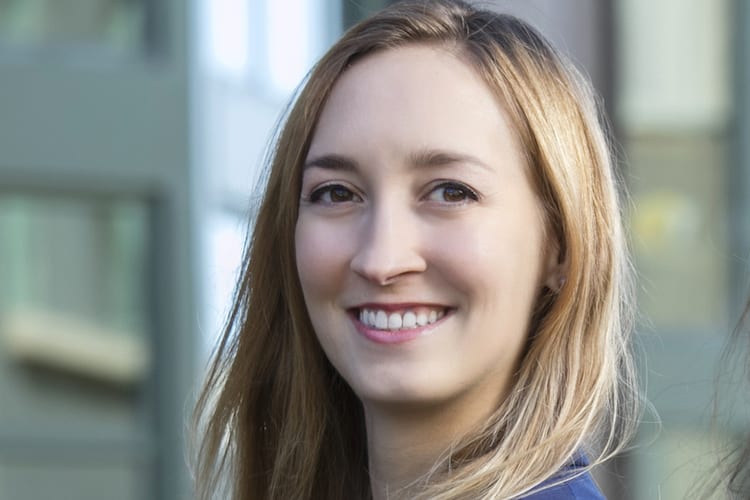 Ashley Lannquist established herself as an up and coming fintech leader well before she crossed the stage at commencement at the Greek Theatre last week.
Ashley Lannquist established herself as an up and coming fintech leader well before she crossed the stage at commencement at the Greek Theatre last week.
Aside from penning a popular blog about blockchain, serving as co-president of the Haas FinTech Club, investing in more than a dozen cryptocurrencies, and consulting and interning in the industry, Lannquist, MBA 18, is now deeply involved with a new global blockchain venture backed by some of the world’s largest auto companies.
Earlier this month, she helped launch the Mobility Open Blockchain Initiative (MOBI), a consortium aimed at developing applications for blockchain in the auto and related industries. She was also appointed to the board of directors of MOBI, which is backed by BMW, Ford, General Motors, and Renault, as well as an A-list group of suppliers, consultancies, and technology companies.
“We’re setting technology and data standards, and developing them with multiple hands on deck to address industry-wide problems,” said Lannquist, who serves as MOBI’s treasurer. “More than 70 percent of global vehicle production is represented in MOBI.”
Blockchain’s big auto move
Blockchain is one of the hottest areas of development in the field of financial technology, or fintech. Blockchain started as a decentralized electronic ledger system for transactions involving bitcoin, the leading digital cryptocurrency. The technology’s association with the cryptocurrency world has given it a dubious image in some circles. But proponents stress that blockchain’s underlying technology of transparent and secure digital records shared in networks of computers has the potential to revolutionize the economy.
In the automotive field, blockchain may someday be used to track auto parts through the supply chain, or to verify odometer settings and repair and maintenance records to stamp out fraud in used-vehicle sales, Lannquist said. Blockchain may also pave the way for decentralized ride-sharing apps, with drivers and riders using peer-to-peer technology instead of going through services like Uber and Lyft.
A South Florida native and former Florida state taekwondo champion, Lannquist arrived at Haas with her sights set on fintech. She was awarded the Haas School’s C & J White Fellowship based on her essay about wanting to help start a fintech club at Berkeley, which she proceed to do before she matriculated.
“She started that essay with a (William Gibson) quote that is strikingly prescient: ‘The future is already here — it’s just not evenly distributed,’” said William Rindfuss, executive director for strategic programs in the Haas Finance Group. “I’m incredibly proud of what Ashley has achieved as a Haas student.”
A digital currency investment pays off
During her first year at Haas, Lannquist joined Blockchain at Berkeley, a student-run organization drawing members from across the university. She took a blockchain course sponsored by the group called “Blockchain Fundamentals” and was hooked. One of her assignments was to open a cryptocurrency investing account and buy some bitcoin. The timing was perfect. Lannquist had started investing just before bitcoin and other digital currencies started their epic bull run.
The profits she pocketed paid her tuition and allowed her to cover the cost of an independent study on blockchain in Germany and Denmark last summer. While there, she wrote and published a three-part blockchain series on Medium, which is still widely read.
While in Germany, she met a blockchain expert working for Daimler, the German automaker, who introduced her to the automotive uses of the technology.
Founding MOBI
When Lannquist returned to Berkeley, Ronen Kirsh, Blockchain at Berkeley’s co-head of consulting, asked her to lead a project to help BMW develop its blockchain strategy. In that role, she met Chris Ballinger, CFO of the Toyota Research Institute in Los Altos, who asked her to help him organize an industry-wide blockchain consortium. Since last November, she and Ballinger have met monthly with automakers and industry startups from Detroit, Europe, and Japan, contacts that led to the foundation of MOBI.
Meanwhile, Lannquist also publishes a widely followed blockchain blog and advises a venture capital fund and a hedge fund on blockchain strategy. While at Haas, she initiated and helped teach a three-day executive education course in blockchain at the UC Berkeley School of Law.
These efforts have made her a rising star in the burgeoning blockchain community and won her a dream job. After graduating, she will work as a blockchain project lead in the San Francisco office of the World Economic Forum, the foundation famous for its elite annual conference in Davos, Switzerland.
There is no question but that diving into blockchain was a great career move. But for Lannquist, it was a natural progression. “I was just interested and excited about the technology,” she stressed. “It was compelling and I was excited to be involved with it.”